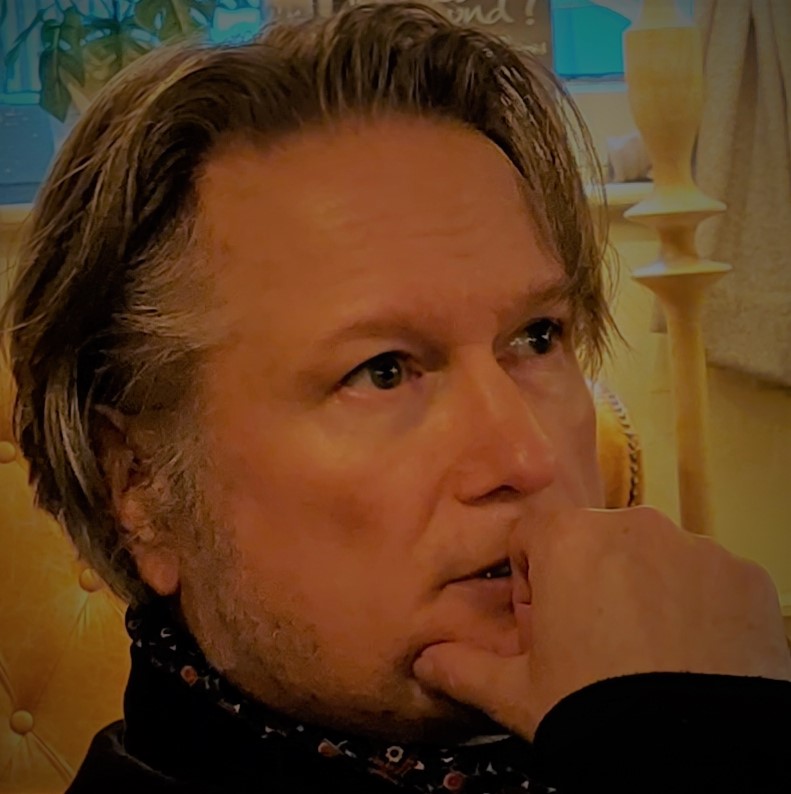The Edinburgh TV Festival blues

Opinion
Stephen Arnell offers his reactions to some of the biggest announcements and goings-on at last month’s Edinburgh TV Festival, and explains why things don’t appear to bode all that well for the future of British TV.
This year’s Edinburgh TV Festival was something of a downbeat affair; the UK’s dire economic situation, knock-on effects of the US actor’s strike and the slowdown in commissioning all put a damper on proceedings.
This general air of unease wasn’t helped by the performance of some industry leaders who (even more than usual) upped their accustomed levels of bullshit, egomania, and self-delusion and pity to Brobdingnagian heights.
Let’s have a look at what the leading lights of UK television were saying during their sojourn in the so-called “Athens of the North.”
Ben Frow’s Double-Secret Resignation
Time to a play a tune on the world’s smallest violin for the curious tale of the resignation that never was. Paramount UK content chief/C5 Grand Fromage Ben Frow claimed that the stress of the job “felt like I was being pecked alive, eaten alive… so I resigned.”
However, his attitude evolved after a few months continuing his role, as he eventually recognised “the lesson I learned was that I shouldn’t have let it go that far,” deciding executives need to “love yourself.”
Frow also confessed that he never shared his anxieties with colleagues, was often angry and would “shake” when questioned. Must have been fun for them; I would have spoken to HR if subjected to such behaviour, but maybe that’s just me.
Personally, I never thought the lack of self-love was ever a problem for channel bosses, certainly amongst the current crop and the many I have worked with in the past. Compared to doctors, nurses, and the emergency services, the role of top TV executive isn’t really that stressful — unless you actually want it to be.
Also, Frow didn’t really resign, did he? No-one at C5 apparently knew, only (presumably) his stateside bosses, reminiscent of Dean Vernon Wormer’s “Double-Secret Probation” from Animal House (1978).
What If?
With BBC content seneschal Charlotte Moore, I recall one of the great “what ifs” of UK broadcasting. Namely, what if former BBC2 controller Kim Shillinglaw had got the CCO gig in 2016 instead of Moore. Informed insiders felt that the collegiate, affable-but-professional Shillinglaw would have been a better fit than Moore, who can come across in public as dismissive, chippy, and arrogant, whilst stridently hewing to the BBC party line on all issues.
Case in point her comment at Edinburgh regarding the exodus of onscreen talent. “When someone moves on it’s not the great moral panic everyone thinks it is,” she said.
Moore also attempted to make a virtue of necessity in claiming the BBC has enacted a “fewer bigger better” approach to TV commissioning well before any prospective license fee rises were stymied and the cost-of-living crunch kicked in.
“Quality and creative ambition is important, and I want suppliers to feel they are able to deliver on that,” she said, emphasising that her team, “has to be careful about what we bring back and what new commissions we make because that mix of returners and new shows is really important.”
Which begs the question why the mediocre resurrected school soap Waterloo Road has been commissioned for two new seasons.
More cheese with that whine, Ian?
C4’s chief content officer Ian Katz doubled down on his trademark “not me, guv” policy of deflection and gaslighting journalists at the festival with a host of easily disputable statements.
For Katz, the blame for low ratings and bad publicity tends to always lie at the door of others, be it media commentators, other broadcasters, uppity independent producers, or the government. Katz never seems to recognise that C4’s comms and his own disingenuous pronouncements may be at fault.
Hence his comments that C4 has “perhaps been a bit more honest” than its rivals in communicating about its commissioning slowdown and financial problems. Katz stated that “other broadcasters have chosen to communicate with suppliers’ whichever way they choose, but I think that has led to the perception that the picture at Channel 4 has been more dramatic than elsewhere.”
In effect, another self-inflicted wound then.
He also bellyached, “The reality is we didn’t ask for in-house,” which is true, but it’s Katz’s job to make it work, not kvetch; especially when he’s one of the highest paid TV executives in the UK.
Katz batted away questions over declining ratings performance after its linear performance sank to an all-time low this summer. He made great play of how the C4 video-on-demand (VOD) is the “public service streamer for young people,” necessitating a commissioning “pivot” (a sign of panic to some) in genres that “do disproportionately well on streaming.”
Yet more chaff, with little if any explanation of how the streamer is performing in wider context, added to the distinct impression of arse-covering. On steroids.
“I don’t have a drug dealer phone”
ITV boss Kevin Lygo has been a fixture of the festival for decades and his antics usually provide good copy. But his was unusually subdued (for him) this year, although, as usual he offered a few hostages to fortune. His verbal “tell” that ITVX has “honestly done better than we hoped” when addressing inquisition at the ITV spotlight panel Q&A was a bit of a giveaway.
Lie Detectors UK on the use of the word “honestly”: “’Honestly’: If you hear someone using this phrase, there’s a good chance they’re not being truthful. Just like with ‘to be honest,’ the word ‘honestly’ is often used by liars to make themselves sound more trustworthy.”
Their words, not mine.
Lygo’s comment regarding the ongoing Schofield inquiry (“I don’t have a drug dealer phone”) struck some as oddly specific, whilst his trumpeting of the 2 billion streams achieved by ITVX echoed Katz’s pitch, sounding superficially impressive but lacking any real context to gauge its actual value.
“Women doing shit”
Yes these are the actual words of eloquent Netflix UK documentary film chief Kate Townsend when describing her plans for more female-led shows.
In full: “Just women being in things and doing stuff is much easier to cast in dramas and docs. […] Just women doing shit would be great. Women being baddies sometimes.” Outstanding.
And I guess she has a point, bearing in mind the line-up of fresh new interesting male faces Netflix UK will bring us in the next few months: Jack Whitehall, David Beckham & Robbie ‘Felix cat food adverts’ Williams.
Déjà vu all over again?
Disney+’s EMEA commissioning arm confirmed many fears about the lack of creative thinking at the London office, as new shows played catch-up with similar fare from other streamers including World War Shoe: Adidas v. Puma (after Amazon’s Air) and Brawn: The Impossible Formula 1 Story (following Netflix’s Drive to Survive).
The news that there will be yet another documentary about 2022’s ‘Wagatha’ trial (Coleen Rooney: The Real Agatha Story) and a series on the Camden music scene hardly set pulses running, although the latter might increase trade at The Good Mixer pub, which was pretty empty last time I was there earlier this year.
To compound Disney’s woes here, their completed mega-budget Captain Nemo series Nautilus has been shitcanned, with the show now on the sales block for any interested parties to pick up. A far cry from 2021, when EMEA VP of original productions Liam Keelan talked up Nautilus at a festival session.
“It will feel really big scale, really epic, I’ve seen the first script and the 10 outlines, and it reads like 10 feature films, really. So it’s going to be a really big deal for us,” he had said.
Really?
Perhaps Disney+ viewers have dodged a metaphorical bullet, as Nautilus was written and executive produced by James Dormer, whose frankly ropey résumé includes the teatime ITV flop Beowulf: Return to the Shieldlands (2016), Medici: The Magnificent (2018), Sinbad (2012), The Musketeers (2014) and the truly dire Nicolas Cage medieval movie Outcast (2014).
Podcast: Disney and gambling ads, Clear Channel’s European challenge, and our new AI columnist
Sky’s Limits?
At Edinburgh, Sky proved a tad more ambitious than either the UK arms of Disney+ and Netflix, with the Jacobean drama series Mary & George looking interesting, the adaptation of The Tattooist of Auschwitz obvious awards bait, and Louis Theroux’s documentary feature Tell Them You Love Me potentially offering a new twist on true crime.
But in the round, hardly earth-shattering stuff, especially considering the news of Sky commissioning Kardashians, Dickens, Attenborough, and Rob Beckett, all of whom are ubiquitous in the extreme.
And I can’t say Sky Arts’ Battle of the Bagpipes will do much for me either, but different strokes and all that…
 Stephen Arnell began his career at the BBC, moving to ITV where he launched and managed digital channels. He continues to consult for streamers and broadcasters on editorial strategy. He currently writes for The Spectator, The Independent, and The Guardian on film, TV and cultural issues. He is also a writer/producer (including Bob Fosse: It’s Showtime for Sky Arts) and novelist.
Stephen Arnell began his career at the BBC, moving to ITV where he launched and managed digital channels. He continues to consult for streamers and broadcasters on editorial strategy. He currently writes for The Spectator, The Independent, and The Guardian on film, TV and cultural issues. He is also a writer/producer (including Bob Fosse: It’s Showtime for Sky Arts) and novelist.



